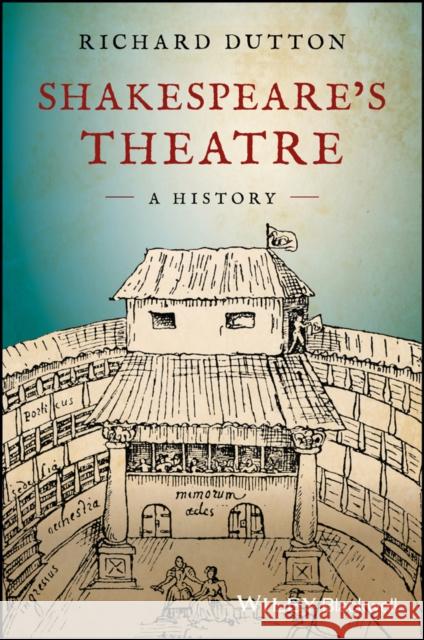Shakespeare's Theatre: A History » książka
Shakespeare's Theatre: A History
ISBN-13: 9781405115131 / Angielski / Twarda / 2018 / 384 str.
Shakespeare's Theatre: A History
ISBN-13: 9781405115131 / Angielski / Twarda / 2018 / 384 str.
(netto: 328,72 VAT: 5%)
Najniższa cena z 30 dni: 340,24
ok. 30 dni roboczych.
Darmowa dostawa!
Richard Dutton, who will also propose a Companion on the same subject as his history, to add to the four Companions to Shakespeare's Works he has co-edited with Jean Howard, is probably the world's leading authority on the history of the Shakespeare's theatre and more broadly, theatre in England through the Tudor to the Jacobean period. What is more his sophistication as a cultural theorist and historicist is widely acknowledged by his peers. He writes lucidly and accessibly. His proposal is also especially timely. It is thirty years since G. E. Bentley poured a lifetime's work on the early modern English stage into The Profession of Dramatist in Shakespeare's Time, 1590-1642 (1971), complemented and rounded out later by The Profession of Player in Shakespeare's Time, 1590-1642 (1984). Between them, these represented the summation of a tradition of scholarship on the working conditions of Shakespeare and his contemporary dramatists -- on the kinds of theatre, audiences, patrons and players for which they wrote. It went back through Bentley's own work on the Jacobean and Caroline theatres, and the parallel labours of such as Glynne Wickham, through E. K. Chambers' magisterial The Elizabethan Stage (1923), and ultimately back to the pioneering efforts of Edmond Malone at the end of the eighteenth century to locate these matters within a coherent and comprehensible historical record.
This was the tradition that also produced, for example, Samuel Schoenbaum's William Shakespeare: A Documentary Life (1975), and was conveniently encapsulated for more general consumption in the first edition of Andrew Gurr's The Shakespearean Stage (1970). It was positivist theatrical history, heavily driven by conservative interpretations of what it chose to accept as factual evidence, chary of social, economic, cultural and political explanations which were not tangibly part of the written record. At the same time, it was often dogged (more or less unconsciously) by a Whiggish view of the sixteenth and seventeenth centuries as a struggle between authoritarian monarchies and elements in the country which resisted arbitrary and repressive government -- a struggle which culminated in the Civil War. The theatre was often cast as an unfortunate pawn in this struggle: a popular/professional art-form adopted by the aristocracy, reviled and resisted by puritans (especially in the City of London), latterly made decadent by over-dependence on the court, and finally swept away by the closure of the theatres in 1642.
Much of the evidence-base unearthed by this tradition of theatre history remains indispensable. But since Bentley our understanding of the early modern era (a terminology itself loaded with cultural freight) has been transformed out of all recognition: by social and political historians (Marxist and revisionist both), and by new historicist, cultural materialist and feminist-historicist literary scholars, as well as by more conventional theatre historians. To mention only some of the most obvious and far-reaching issues:
* the nature of patronage in the period has been re-examined by scholars too numerous to mention, revealing it to be less a matter of aristocratic largesse than part of the essential socio-economic fabric, a system of nuanced reciprocal exchanges which bound society together; these matters are beginning to be explored in relation to dramatic patronage, where the nature of the implied relationship is still little understood -- a major collection of essays on this subject, edited by Paul W. White and Suzanne Westfall, was recently published by Cambridge UP.
* our understanding of theatrical practice in the period is being radically changed by the coming to fruition of the Records of Early English Drama project, as may be seen in such publications as Andrew Gurr's The Shakespearian Playing Companies (1996) and Scott McMillin and Sally-Beth MacLean's The Queen's Men and their Plays (1999): the latter is the first sustained attempt to make the theatrical 'company' (a term also in debate) the centre of attention, rather than playwrights, theatres or dramatic genres; critically, this work has forced us to look earlier than the 1590 watershed favoured by Chambers and Bentley (as the putative starting point of Shakespeare's career) and wider than the heavy London focus which this implied, enabling us to see the earlier drama not just as a clumsy fumbling towards the wonders of the Globe and making us rethink such questions as theatrical touring; these issues will be addressed again in two forthcoming Lancastrian Shakespeare volumes (Manchester UP, ed. Findlay, Wilson & Dutton).
* our knowledge of the economics of Elizabethan theatre (and with it our understanding of the 'objections' to it by various City of London authorities) has been transformed by such pioneering studies as those of Susan Cerasano on Philip Henslowe and Edward Alleyn, and by William Ingram's major works, especially The Business of Playing: The Beginnings of Adult Professional Theater in Elizabethan London (1992); this meshes with much work looking at theatre practices in relation to cognate social practices, such as the organisation of trade guilds (to which many of the actors belonged), money-lending and share-holding.
* the social and sexual composition of early modern theatre audiences -- once supposedly 'settled' by Alfred Harbage -- became the focus of a spirited, and unresolved, debate in the 1980s, involving such figures as Anne Jennalie Cook, Andrew Gurr, Martin Butler and Kathleen McLuskie.
* parallel to this, the practice of boys/young men playing the roles of women on the early modern stage has been ransacked for its implications, both as a business practice and as a matter of gender signification.











